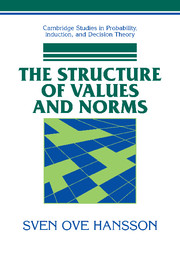9 - A Starting Point for Deontic Logic
Published online by Cambridge University Press: 13 August 2009
Summary
This and the following four chapters are devoted to deontic logic, the logic of normative sentences. Informal normative notions are quite complex and have meaning components related to agency, possibility, commitment, conditionality, defeasibility, the application of rules, etc. The general strategy chosen here is to first identify instances in which as many as possible of these complicating factors are absent or can reasonably be abstracted from. This will be done in the present chapter. In Chapter 10, the logical investigation of these comparatively simple cases is carried out, and in Chapters 11–13 some of the complicating factors are reintroduced into the analysis.
WHAT NORMATIVE PREDICATES REFER TO
It is generally recognized that there are three major groups of normative expressions in ordinary language, namely prescriptive, prohibitive, and permissive expressions. In the formal language, they are represented by the corresponding three types of predicates. Here, prescriptive predicates will be denoted by “O” (with indices to differentiate between different such predicates), permissive predicates by “P,” and prohibitive predicates by “W.” (These are abbreviations of “ought”, “permitted,” and “wrong.”)
We need to determine what type of arguments these normative predicates should be applied to. In nonformalized discourse on norms, words expressing prescriptions, prohibitions, and permissions refer in most cases to actions and other human behaviour. “Roberta is permitted to enter this building” refers to the action consisting of Roberta entering the building in question.
- Type
- Chapter
- Information
- The Structure of Values and Norms , pp. 129 - 138Publisher: Cambridge University PressPrint publication year: 2001

